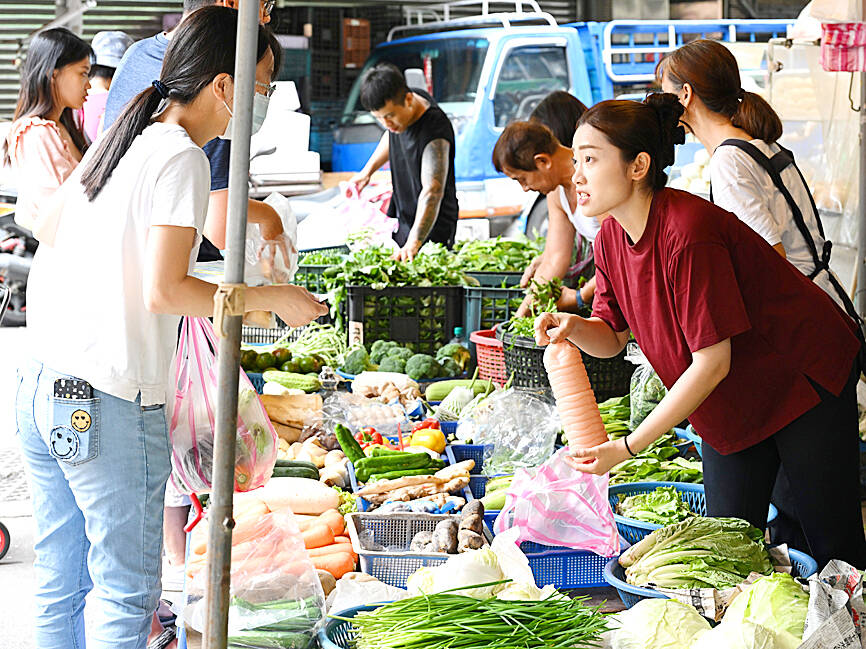The consumer price index (CPI) last month grew 2.52 percent from a year earlier, the most in five months and up from 2.42 percent a month earlier, as Typhoon Gaemi destroyed fruit and vegetable crops, driving up prices, the Directorate-General of Budget, Accounting and Statistics (DGBAS) said yesterday.
The disruption from Gaemi would become more evident this month, as it hit Taiwan the hardest on July 24 and 25 and crops would need several weeks to recover, DGBAS official Tsao Chih-hung (曹志弘) told a news conference in Taipei.
Outside of the storm damage, inflationary pressures have subdued to healthy territory given the core CPI’s 1.84 percent increase, the fifth consecutive month below the central bank’s 2 percent target, Tsao said.

Photo: Chen Yi-kuan, Taipei Times
The core CPI is favored by the monetary policymaker as a more reliable indicator of long-term price movements because it excludes volatile items such as fruit, vegetable and energy costs.
The headline CPI rose 0.19 percent from June, but the reading tapered to 0.09 percent after seasonal adjustments, affirming a stable price trajectory, the agency said.
Heavy rainfall and storms underpinned a 4.57 percent hike in food costs, the largest chunk of CPI weighting, as fruit and vegetable prices soared 27.23 and 8.58 percent respectively from year-earlier levels, Tsao said, adding that eating out expenses rose 2.77 percent.
However, the prices of eggs, a popular breakfast choice, slumped 16.27 percent due to abundant supply, he said.
“People might feel the pinch more acutely as fruits and vegetables are frequently purchased items,” Tsao said.
Costs for medicine and healthcare rose 3.24 percent as hospitals and clinics increased registration fees, as well as treatment and drug charges, to reflect higher personnel and operating costs, the DGBAS said.
Medical facilities are facing labor shortages, with many increasing compensation in a bid to retain nurses and doctors.
Shelter costs rose 2.31 percent, as landlords hiked rents to reflect more expensive electricity and home repair costs, the agency said.
At the same time, education and entertainment prices rose 1.86 percent, as demand for KTV parlors and overseas tours has been robust this summer, it said.
The producer price index (PPI), which measures the price movements of goods from a seller’s perspective, rose 3.74 percent from a year earlier, as bad weather increased agricultural prices, while computer, electronic and optical product vendors also raised prices, the DGBAS said.
In the first seven months, the CPI increased an average of 2.3 percent, while the PPI expanded 1.72 percent, it said.

The US dollar was trading at NT$29.7 at 10am today on the Taipei Foreign Exchange, as the New Taiwan dollar gained NT$1.364 from the previous close last week. The NT dollar continued to rise today, after surging 3.07 percent on Friday. After opening at NT$30.91, the NT dollar gained more than NT$1 in just 15 minutes, briefly passing the NT$30 mark. Before the US Department of the Treasury's semi-annual currency report came out, expectations that the NT dollar would keep rising were already building. The NT dollar on Friday closed at NT$31.064, up by NT$0.953 — a 3.07 percent single-day gain. Today,

‘SHORT TERM’: The local currency would likely remain strong in the near term, driven by anticipated US trade pressure, capital inflows and expectations of a US Fed rate cut The US dollar is expected to fall below NT$30 in the near term, as traders anticipate increased pressure from Washington for Taiwan to allow the New Taiwan dollar to appreciate, Cathay United Bank (國泰世華銀行) chief economist Lin Chi-chao (林啟超) said. Following a sharp drop in the greenback against the NT dollar on Friday, Lin told the Central News Agency that the local currency is likely to remain strong in the short term, driven in part by market psychology surrounding anticipated US policy pressure. On Friday, the US dollar fell NT$0.953, or 3.07 percent, closing at NT$31.064 — its lowest level since Jan.

The New Taiwan dollar and Taiwanese stocks surged on signs that trade tensions between the world’s top two economies might start easing and as US tech earnings boosted the outlook of the nation’s semiconductor exports. The NT dollar strengthened as much as 3.8 percent versus the US dollar to 30.815, the biggest intraday gain since January 2011, closing at NT$31.064. The benchmark TAIEX jumped 2.73 percent to outperform the region’s equity gauges. Outlook for global trade improved after China said it is assessing possible trade talks with the US, providing a boost for the nation’s currency and shares. As the NT dollar

The Financial Supervisory Commission (FSC) yesterday met with some of the nation’s largest insurance companies as a skyrocketing New Taiwan dollar piles pressure on their hundreds of billions of dollars in US bond investments. The commission has asked some life insurance firms, among the biggest Asian holders of US debt, to discuss how the rapidly strengthening NT dollar has impacted their operations, people familiar with the matter said. The meeting took place as the NT dollar jumped as much as 5 percent yesterday, its biggest intraday gain in more than three decades. The local currency surged as exporters rushed to